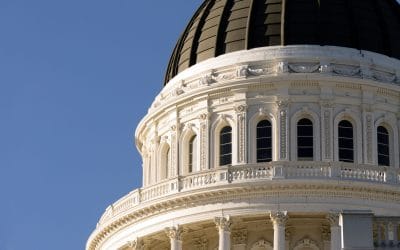Capitol Advisors Group has produced a series of comprehensive client briefs detailing new education laws that were passed by the Legislature and signed into law by Governor Brown in 2017. Each brief is organized by subject area and includes an executive summary highlighting major changes we think you should know about. Bills signed by the Governor take effect on January 1, 2018, unless the bill specifically states otherwise. A PDF version of this report is available here.
Janus v. AFSCME. The undercurrent driving many of this year’s bills pertaining to employer-employee relations is Janus v. American Federation of State, County, and Municipal Employees, Council 31, a case currently pending before the United States Supreme Court.
Set to be decided prior to summer 2018, the petitioners behind Janus are seeking to reverse 40-year-old case law requiring all public employees covered by a bargaining unit to pay “fair share” or “agency” fees to the unit, regardless of the employee’s willingness to join the union. A secondary question in Janus is whether public employees must opt-in (versus opt-out) of the union’s political dues, which has major effects on the ability to raise political funds. Many believe the Court’s conservative majority has the potential to strike a major blow to the financial and membership health of public employee unions and the political causes they support.
In anticipation, the Brown Administration negotiated with labor and management groups on a measure (Assembly Bill 119, authored by the Assembly Committee on Budget) to require union access to new hires during whatever process a public employer uses to advise new hires of their employment status, rights, and benefits. The bill avoids prescriptive language related to the details of this access. Instead, the parties must reach mutual agreement regarding the structure, time and manner of union access to new employee orientations, with failure to reach agreement subject to compulsory arbitration.
Employer hiring practices. Public employers will now be barred from seeking a prospective employee’s past salary history, unless the information is voluntarily disclosed by the applicant (AB 168, by Assembly Member Susan Talamantes Eggman (D–Stockton)). Employers will also be prohibited from inquiring about or considering a job applicant’s conviction history prior to a conditional offer of employment, except in certain instances (AB 1008, by Assembly Member Kevin McCarty (D–Sacramento)).
Employee benefits. The expansion of public employee benefits tends to be a perennial topic of interest for lawmakers. This year was no exception, with the passage and signing of bills like Senate Bill 63, by Senator Hannah Beth Jackson (D–Santa Barbara)—which requires most employers to provide eligible employees up to 12 weeks of job protected parental bonding leave for a new child—and AB 670, by Assembly Member Tony Thurmond (D–Richmond)—which folds part-time playground positions into the classified service.
Despite the Legislature’s enthusiasm towards expanding public employee benefits, Governor Brown vetoed several high-profile bills, citing principles of local control or the sufficiency of existing law. Assembly Member Raul Bocanegra (D–Arleta) authored AB 621 to allow certain classified school employees to contribute earnings to a summer furlough fund, which would have been matched by the state on a two-to-one basis. The Governor vetoed AB 621 on the basis that “employee compensation is a matter subject to local collective bargaining.” For similar reasons, the Governor vetoed AB 568, by Assembly Member Lorena Gonzalez Fletcher (D–San Diego), which would have required school districts, charter schools, and community colleges to provide at least six weeks of full pay for pregnancy-related leaves of absence taken by certificated, academic, and classified employees.
Retirement. The California State Teachers’ Retirement System (CalSTRS) and California Public Employees’ Retirement System (CalPERS) received significant legislative attention this year due to the increasing cost pressures on school district budgets. Although some conservative legislators have proposed (unsuccessfully) to significantly modify or restructure the pension systems, the number of new laws affecting CalSTRS and CalPERS are quite limited due to the broad autonomy of the respective retirement boards.
- County office CalPERS collections. In order to pay school district contributions to the CalPERS “replacement benefit plan,” AB 1243, by Assembly Member Joaquin Arambula (D–Fresno), authorizes a county superintendent of schools to draw direct requisitions against the county school service fund and the funds of the respective school districts.
- Divestment legislation neutralized. Legislators occasionally view the robust investment portfolios of its two major pension systems as mechanisms to influence national or global political issues, despite the significant costs associated with divestment mandates. One such bill from the 2017 session was stripped of its mandate requirements—AB 20 (relating to the Dakota Access Pipeline and tribal sovereignty/rights), by Assembly Member Ash Kalra (D–San Jose)—while similar legislation stalled in the Legislature: AB 1597 (Turkish investment vehicles), by Assembly Member Adrin Nazarian (D–Sherman Oaks); AB 946 (Trump Administration “border wall” construction companies), by Assembly Member McCarty; and SB 560 (climate change risks), by Senator Benjamin Allen (D–Santa Monica).
Prescription drug price transparency bill signed. The year-over-year cost increases for employer-provided healthcare continue to create substantial cost pressures for school districts. One measure that may, in the long-term, curb these cost increases is SB 17, by Senator Ed Hernandez (D–Azusa), which establishes drug price cost transparency.
The Governor signed the following Human Resources bills this year:
Human Resources
- AB 46 (Cooper) – Employers: wage discrimination
This bill expands the California Equal Pay Act to apply to public sector employers. Under the Equal Pay Act, an employer is generally prohibited from paying an employee wage rates less than the rates paid to employees of the opposite sex, or employees of a different race or ethnicity, for substantially similar work requiring the same skills, effort, and responsibility when performed under similar working conditions.
Chapter 776, Statutes of 2017 - AB 168 (Eggman) – Employers: salary information
This bill prohibits all employers, including local governments, from seeking salary history information about an applicant for employment and requires an employer to provide the pay scale for a position to an applicant upon reasonable request. If an applicant voluntarily and without prompting discloses salary history information to a prospective employer, nothing in this section shall prohibit that employer from considering or relying on that voluntarily disclosed salary history information in determining the salary for that applicant.
Chapter 688, Statutes of 2017 - AB 450 (Chiu) – Employment regulation: immigration worksite enforcement actions
This bill prohibits an employer from providing a federal government immigration enforcement agent access to any non-public areas of a place of labor if the agent does not have a warrant.
Chapter 492, Statutes of 2017 - AB 500 (Bloom) – Employee codes of conduct: employee interactions with pupils
This bill requires local educational agencies (LEAs) or private schools that include a section on employee interactions with pupils in their employee codes of conduct to provide a written copy of that section to the parents of each child enrolled at the beginning of the school year.
Chapter 580, Statutes of 2017 - AB 670 (Thurmond) – Classified employees: part-time playground positions
This bill removes the provision exempting part-time playground positions at school districts from classified service.
Chapter 582, Statutes of 2017 - AB 872 (Chau) – School employees: employment: sex offenses
This bill updates the list of sex offenses that require the Commission on Teacher Credentialing (CTC) to suspend a person’s credential by referencing the list of offenses in the California Penal Code that require registration as a sex offender.
Chapter 167, Statutes of 2017 - AB 949 (Gipson) – School employees: contracts: sole proprietors: criminal background checks
Current law requires all schools to conduct criminal background checks before employing individuals in non-certificated positions and before contracting with an entity for employees that may interact with pupils. This bill clarifies that school districts contracting with a sole proprietor for specified services must prepare and submit the fingerprints of that individual to the Department of Justice (DOJ).
Chapter 84, Statutes of 2017 - AB 1008 (McCarty) – Employment discrimination: conviction history
This bill prohibits an employer, with certain exceptions, from inquiring about or considering a job applicant’s conviction history prior to a conditional offer of employment, and sets requirements regarding the consideration of conviction histories in employment decisions.
Chapter 789, Statutes of 2017 - AB 1556 (Stone, Mark) – Employment discrimination: unlawful employment practices
This bill updates the Fair Employment and Housing Act to use gender-inclusive references to individuals, thereby clarifying that Californians are protected against discrimination, including pregnancy discrimination, regardless of their gender identity.
Chapter 799, Statutes of 2017 - SB 63 (Jackson) – Unlawful employment practice: parental leave
This bill makes it an unlawful employment practice for an employer, of 20 or more employees, to refuse to allow an eligible employee to take up to 12 weeks of job protected parental leave to bond with a new child within one year of the child’s birth, adoption or foster care placement. This bill also prohibits an employer from refusing to maintain and pay for the employee’s continued group health coverage during the duration of the leave.
Chapter 686, Statutes of 2017 - SB 306 (Hertzberg) – Retaliation actions: complaints: administrative review
This bill grants the Labor Commissioner, within the Department of Industrial Relations, authority to seek an immediate and temporary injunction when workers face retaliation for reporting violations of the law.
Chapter 460, Statutes of 2017 - SB 396 (Lara) – Employment: gender identity, gender expression, and sexual orientation
For employers with 50 or more employees, adds as a component of prescribed training and education for supervisors, training inclusive of harassment based on gender identity, gender expression, and sexual orientation.
Chapter 858, Statutes of 2017 - SB 489 (Bradford) – Workers’ compensation: change of physician
For purposes of worker’s compensation, requires that in the case of emergency treatment services, specified requests for payment for treatment must be submitted to the employer, or its insurer or claims administrator, within 180 days of the date the service was provided.
Chapter 240, Statutes of 2017 - SB 550 (Pan) – Public school employment: meeting and negotiating: legal actions: settlement offer: attorney’s fees
This bill requires an employer that rejects an employee organization’s settlement offer to pay the employee organization’s reasonable attorney fees and expenses if the employer fails to obtain a judgment or reward more favorable than that provided in the settlement offer. The fee shifting procedure would not apply to unfair practice or arbitration proceedings.
Chapter 812, Statutes of 2017 - SB 731 (Newman) – Public school employees: former or current members of the Armed Forces of the United States or California National Guard: leave of absence for illness or injury
This bill grants to current classified and certificated school employees – who are former active duty members of the United States Armed Forces or who are former or current members of the National Guard or a federal military reserve component, and who have a qualifying service-connected disability – additional, pre-banked paid leave to undergo medical treatment for their service-connected disabilities.
Chapter 597, Statutes of 2017
Health Care
- SB 17 (Hernandez) – Health care: prescription drug costs
To increase drug price transparency, SB 17 requires health plans and insurers to annually report to the state regarding the 25 most frequently prescribed drugs, the 25 most costly drugs, and the 25 drugs with the highest annual increase in price. The bill establishes other reporting and disclosure requirements, as well.
Chapter 603, Statutes of 2017
Commission on Teacher Credentialing
- AB 226 (Cervantes) – Teacher credentialing: spouses of active duty members of the Armed Forces: expedited application process
This bill requires the CTC to grant or deny a credential application within 7 days if the applicant is married to, or in a domestic partnership or other legal union with, an active duty member of the Armed Forces of the United States who is assigned to a duty station in this state under official active duty military orders and holds a valid teaching credential in another state, district, or territory of the United States.
Chapter 436, Statutes of 2017 - AB 681 (Chau) – Teacher credentialing: teacher preparation outside of the United States: temporary certificates
Provides that, if the CTC determines that another country’s national teacher licensure standards are equivalent to those of a regionally accredited institution in the United State, an individual who holds or is eligible for a credential in that country is presumed to have satisfied specified requirements for obtaining a California credential.
Chapter 199, Statutes of 2017
Retirement/PERS/STRS
- AB 20 (Kalra) – Public employee retirement systems: divestment: Dakota Access Pipeline
This bill requires CalSTRS and CalPERS to report (on or before April 1, 2018), information regarding investments in, and engagement with, companies constructing or funding the construction of the Dakota Access Pipeline. The bill also declares the Legislature’s intent that CalSTRS and CalPERS review and consider factors related to tribal sovereignty and indigenous tribal rights as part of their respective investment policies related to environmental, social and governance issues.
Chapter 575, Statutes of 2017 - AB 590 (Medina) – Public employees’ retirement: membership election
An employee covered by a CalPERS retirement plan may elect to retain CalPERS membership when switching to a CalSTRS-covered position. AB 590 would provide greater flexibility to remain in CalPERS by creating a 120 day window from the time the employee switched positions so that the employee could retain eligibility to elect to remain in CalPERS either when starting at a new district or when starting a new position in the same district in the next schoolyear (e.g., after the summer break). Under a related program in which CalSTRS members can retain CalSTRS membership when moving into CalPERS covered employment, the member does not have the same break in service issue.
Chapter 108, Statutes of 2017 - AB 679 (Cooley) – Public employees’ retirement: investments: security loans
The Public Employees’ Retirement Law grants the CalPERS Board exclusive control of, and fiduciary responsibility for, the investment of its fund, and authorizes the board to enter into specific types of security loan agreements, whereby a legal owner (the lender) agrees to lend specific marketable corporate or government securities for no more than one year, and the lender retains the right to collect from the borrower all dividends, interest, premiums, rights, and other distributions. Current law grants the board the authority to enter into these agreements pursuant to specific provisions covering security loan agreements by state agencies. This bill would delete the above reference to the security loan provisions for state agencies, thereby providing the board with separate authority to enter into security loan agreements.
Chapter 198, Statutes of 2017 - AB 1243 (Arambula) – Public Employees’ Retirement System: replacement benefits plan
In order to pay school district contributions to the CalPERS replacement benefit plan, this bill would authorize a county superintendent of schools to draw requisitions against the county school service fund and the funds of the respective school districts or other LEAs in amounts equal to the total of the contributions required to be paid pursuant to replacement benefit plan provisions.
Chapter 277, Statutes of 2017 - AB 1325 (Committee on Public Employees, Retirement, and Social Security) – State teachers’ retirement
This is the annual housekeeping bill sponsored by CalSTRS that makes various technical and conforming changes to the Education Code enabling CalSTRS to more effectively administer the State Teachers’ Retirement Plan.
Chapter 298, Statutes of 2017 - AB 1487 (Rodriguez) – Public Employees’ Retirement System: limited term appointments
Current law does not authorize the inclusion of temporary upgrade pay to be used in determining pensionable compensation for new members employed by local public employers and school employers. It also prohibits an annuitant from working after retirement for an employer that is part of the same retirement system except that a retired annuitant may be employed on a temporary basis not to exceed 960 hours in a fiscal year. This new law establishes a 960-hour limit per fiscal year on out-of-class appointments in which employers temporarily place current employees in vacant positions of a higher classification, or temporarily upgrade their position.
Chapter 229, Statutes of 2017 - SB 525 (Pan) – Public employees’ retirement
SB 525 is the annual CalPERS “housekeeping” legislation that provides technical, non-controversial, and cost-neutral amendments to portions of the Government Code that affect CalPERS.
Chapter 241, Statutes of 2017
Teacher Shortage
- AB 170 (O’Donnell) – Teacher credentialing
This bill deletes the requirement that, for issuance of a multiple subject teaching credential or a preliminary multiple subject teaching credential, the baccalaureate degree be in a subject other than professional education.
Chapter 123, Statutes of 2017 - AB 461 (Muratsuchi) – Personal income taxes: exclusion: forgiven student loan debt
For tax years beginning on or after January 1, 2017, and before January 1, 2022, this bill revises the exclusion from gross income for the amount of student loan indebtedness repaid or canceled pursuant to federal law, relating to income-based repayment to include student loan indebtedness canceled, pursuant to federal law, that includes other repayment plans.
Chapter 525, Statutes of 2017 - AB 584 (Quirk-Silva) – Student financial aid: California Student Opportunity and Access Program: Orange County
The Student Opportunity and Access Program, administered by the Student Aid Commission, distributes funds on a progress payment schedule for projects designed to increase the accessibility of postsecondary educational opportunities for certain groups of elementary and secondary school pupils and, to the extent of available resources, for community college students. This bill would, contingent upon sufficient funding provided in the annual Budget Act or other statute, require the Student Aid Commission to ensure that at least one consortium is established to serve the pupils of Orange County.
Chapter 500, Statutes of 2017 - AB 1157 (Mullin) – School property: school district advisory committees: teacher and school district employee housing: property tax exemption
Authorizes the governing board of a school district to decide not to appoint a school district advisory committee in the sale, lease, or rental of excess real property to be used for teacher or school district employee housing. Provides that the construction, reconstruction, or renovation of rental housing facilities for school district employees constitutes a permissible capital outlay expenditure of the financing proceeds obtained by the school district. Also provides that the tax exemption for school, college, or university property applies to an interest in property belonging to the state, a county, a city, a school district, or a community college district that is used to provide rental housing for employees of one or more public school or community college districts.
Chapter 717, Statutes of 2017




0 Comments